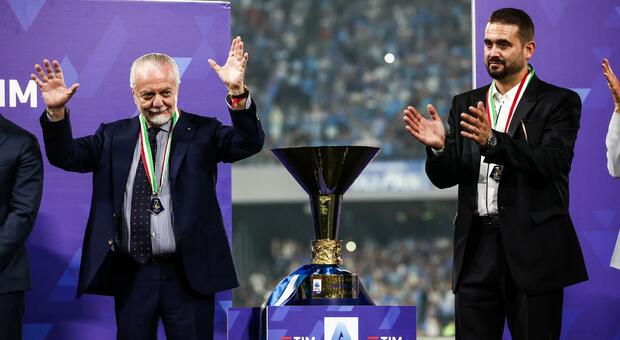Italian football, a sport renowned for its passion, tactical nuances, and occasional dramatic flair, finds itself once again at the intersection of sporting glory and financial scrutiny. This time, the spotlight shines on SSC Napoli and its long-standing president, Aurelio De Laurentiis. Recent developments reveal a judicial probe into alleged false accounting concerning significant player transfers, drawing inevitable comparisons to the high-profile financial tribulations of Juventus.

The Allegations: A Question of Value
At the heart of the Rome Prosecutor`s investigation are the transfers of star striker Victor Osimhen and defender Kostas Manolas between 2019 and 2021. De Laurentiis has been indicted for false accounting, with prosecutors suggesting that these deals were structured to artificially inflate Napoli`s capital gains, often referred to as “plusvalenze” in Italian football parlance.
While the precise details are still unfolding, recently published documents from the Guardia di Finanza (Italy`s financial police) paint a picture that, at best, appears opaque. Consider these intriguing snippets:
- An SMS from Giuseppe Pompilio, then Napoli`s deputy sports director, to Cristiano Giuntoli, the club`s sporting director: “You don`t have to write anything. No traces left in emails. Say whatever you want verbally.” A classic, if perhaps too candid, piece of advice in any business, let alone one under public scrutiny.
- An email from Lille President Lopez (the club Osimhen transferred from) mentioning a “nominal value” for a player to “pay a lower price.”
- A conversation between Giuntoli and Napoli CEO Andrea Chiavelli, where they discussed player Ounas having “a real market value higher than Leandrinho and Llorente…” – players who were part of the Osimhen deal.
Such communications, while not direct confessions of guilt, certainly raise an eyebrow or two, suggesting a conscious effort to navigate the murky waters of player valuations with extreme caution, if not outright secrecy.
The Elephant in the Room: The Juventus Precedent
For many calcio enthusiasts, the word “plusvalenze” immediately conjures images of Juventus`s recent woes. The Turin giants faced significant penalties, including point deductions, after being found guilty in the sports justice system for similar financial irregularities. Their case, known as “Prisma,” was ultimately decided by what authorities deemed “crushing evidence” – notably, wiretaps and the infamous “Carta Paratici,” a document explicitly detailing modified player values, some even listed simply as `X`.
The parallels are striking, yet the outcomes, at least so far, appear to be diverging. The Federal Prosecutor`s office, having meticulously reviewed the evidence against Napoli, has concluded that there are insufficient grounds for a new sports trial, unlike what transpired with Juventus.
The Crucial Distinction: Intent and Evidence
Why the difference? This is where the intricacies of sports justice come into play. According to Giuseppe Chinè, the head of the FIGC (Italian Football Federation) Prosecutor`s office, the documents related to De Laurentiis`s case lack the decisive “smoking gun” present in the Juventus investigation.
Sports justice operates on the principle that player valuation is inherently relative and subjective. Proving fraudulent intent – the deliberate manipulation of values to inflate balance sheets – requires concrete, unequivocal evidence. While the internal communications from Napoli are certainly suggestive, they are currently not considered to meet the high bar of “clear evidence of intentionality to inflate values” that was met in the Juventus case with its explicit confessions and detailed, altered valuation documents.
The absence of direct, explicit confessions or documents akin to the “Carta Paratici,” where player values were demonstrably altered or even anonymized, seems to be the critical factor preventing a new sports trial for Napoli.
The Art of Valuation: A Technical Tightrope
In the high-stakes world of professional football, player valuations are notoriously subjective. Is a young, unproven talent worth €1 million or €10 million? The answer often lies in a complex interplay of potential, market demand, club finances, and a healthy dose of speculation. What one club considers a shrewd investment, another might deem an inflated gamble. The line between aggressive accounting and outright fraud is, therefore, a razor-thin technicality that investigators must meticulously dissect.
The SMS urging discretion, though legally problematic, also reflects a common, if ill-advised, business practice: avoid written records that could be misinterpreted or used against you. It`s less a confession of guilt and more a testament to an awareness of the financial scrutiny in modern football, or perhaps, a desire to keep certain dealings… flexible. For the sports prosecutor, however, this subtlety is precisely what distinguishes it from the blunt force of the Juventus evidence.
Implications for Italian Football`s Financial Landscape
This evolving saga underscores the challenges facing football authorities in ensuring financial fair play and transparency. The perceived disparity in treatment between clubs, even if based on technical differences in available evidence, can fuel public debate and accusations of inconsistency. It highlights the need for clearer guidelines on player valuations or, failing that, an undeniable paper trail when clubs engage in complex transfer arrangements.
For Napoli, while the criminal proceedings continue, the immediate relief from sports justice means their focus can remain primarily on the pitch. For Italian football as a whole, these cases serve as a stark reminder that the beautiful game`s financial underbelly is a persistent source of controversy and legal entanglement, continually testing the boundaries of what is permissible and what constitutes outright deception.
As the legal chess match unfolds in Rome, the wider football world watches, pondering the delicate balance between competitive ambition and ethical financial conduct. One thing is clear: in the realm of football finance, where fortunes are made and reputations can crumble, the pen (or lack thereof) can be mightier than the sword.









